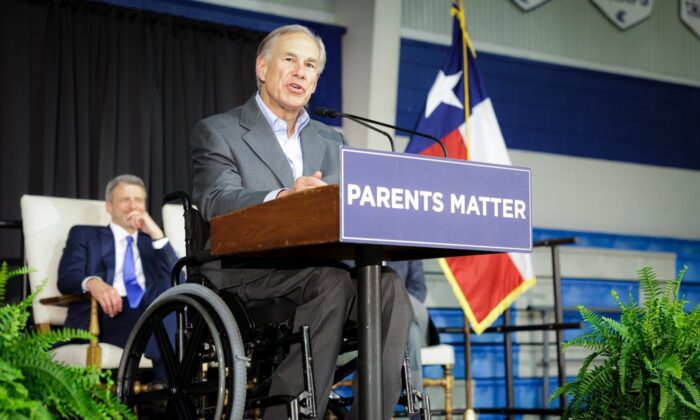Gov. Greg Abbott said he’ll sign the $1 billion measure into law before the 2025-2026 academic year.
Texas would become the largest state in the nation to offer universal school choice to families under a House bill approved along party lines Thursday.
The $1 billion measure passed the House 86–63 in a marathon session that went into the early morning hours, with overwhelming support by the Republican majority and over staunch opposition from Democrats.
Final passage at this point is a formality: It goes back to its original chamber, the Senate, for a review of modifications from what those lawmakers approved in February and potentially a conference committee to reconcile differences in the document between the two chambers, according to the Texas Legislature.
Texas Gov. Greg Abbott said he will sign the final bill into law, saying it will make Texas “the best state in the nation for educating our kids.”
“This is an extraordinary victory for the thousands of parents who have advocated for more choices when it comes to the education of their children,” Abbott said in an April 17 statement.
The bill’s author, state Rep. Brad Buckley, a Republican, said most public schools in Texas do a great job educating children, but “not every student is best served at their local public school.”
The measure provides up to $10,000 per selected child for private school vouchers. Children with special needs or from low-income households are prioritized.
It also provides up to $2,000 for homeschooling expenses and up to $30,000 for special education students who choose a different school. As an education savings plan where qualifying recipients can set up a savings account for school expenses, similar to a health savings account, it also provides money for school transportation, meals, and other services.
Universal school choice legislation has failed in the past, but several Republicans who opposed it were not reelected last year.
On the House floor on Wednesday, Democrats wore “I Love Public Schools” stickers on their lapels.
Democrats have argued that Texas universal school choice allows private schools to deny students admission even though those vouchers are paid with taxpayer dollars that would otherwise go to public schools.
They have also said that many schools in urban areas and suburbs charge more than $40,000 per year and wouldn’t be attainable for low-income recipients.
In addition, Democratic opponents noted that all Texas families are eligible to apply, even millionaires or billionaires, and even those with children who are already in private schools and would otherwise continue paying tuition without taxpayer assistance.
“That simply means that not every child has the opportunity to take advantage of this program,” said Rep. Alma Allen, a Democrat, noting that private schools or public schools outside of an applicant’s ZIP code have the right to reject applicants, unlike the neighborhood schools assigned to families.
Rep. Harold Dutton, a Democrat, proposed a “put your money where your mouth is” amendment to the bill that establishes a sliding scale for the tuition vouchers based on household income, with up to $30,000 a year for the lowest-income applicants and no consideration for families at 500 percent above the poverty line.
“Usually around here, when we have one size fits all, it fits nobody,” he said.
“You are giving children a 10-foot rope for a 12-foot hole. How do you expect them to get out of it?”
Supporters of the bill argued that the average private school in Texas costs less than $10,000 a year.

